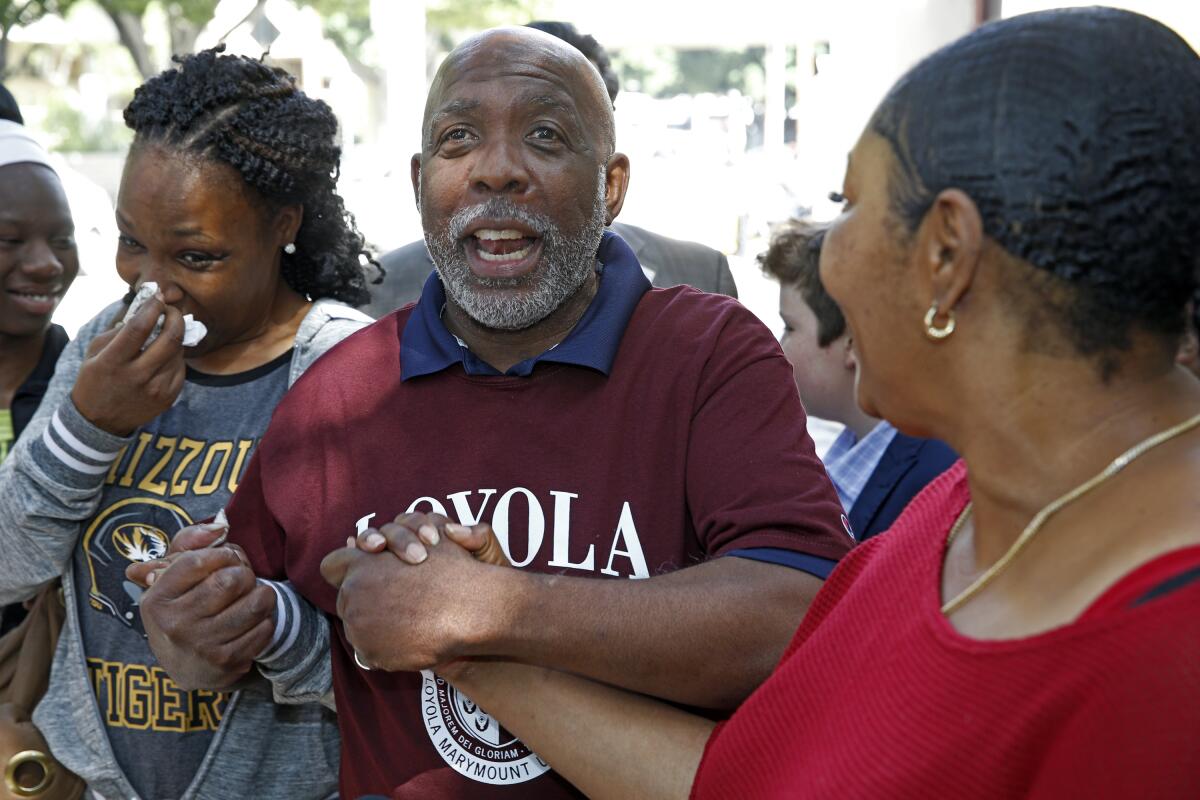$14-million payout approved in L.A. wrongful-conviction case

The Los Angeles City Council approved a $14-million settlement Wednesday for Andrew Wilson, who spent more than three decades behind bars for a murder conviction vacated in 2017.
Wilson was convicted of the 1984 robbery and murder of 21-year-old Christopher Hanson but always maintained his innocence.
His case was taken up by Loyola Law School’s innocence project, which raised questions about the methods used by a Los Angeles police detective to have a witness identify Wilson as the suspect.
The conviction was vacated by a Los Angeles County judge and Wilson was released after 32 years behind bars. He was later found to be factually innocent of the crime.
The teenager stared at 16 mugshots, searching for the face of the man who had stabbed her boyfriend to death while they slept in his pickup truck in South L.A.
The settlement, approved in an 11-0 vote, stems from a 2018 civil rights lawsuit filed by Wilson against the city, Los Angeles County and Richard Marks, the LAPD detective who oversaw the case, regarding the methods used to identify Wilson as a suspect.
The county settled with Wilson for $1.5 million in 2020.
In a confidential memo to the City Council reviewed by The Times, the city’s lawyers expressed doubts about their ability to win at trial, warning that a verdict against the city could result in a monetary reward as high as $32 million.
The settlement is equivalent to around $440,000 per year of incarceration, an amount similar to payments approved by the council in other wrongful conviction cases, the lawyers said in the memo.
The settlement now requires the mayor’s approval.
Wilson’s case demonstrates that investigative procedures regarding witnesses’ identification of suspects need to be reformed, his attorneys said Wednesday,
“This case highlights that until cities and counties institute independent identification procedures, where the investigating officers aren’t involved in the ID process itself, we will continue to have wrongful convictions like this one and government entities will continue to face substantial liability,” said Kevin LaHue, an attorney with McLane, Bednarski & Litt.
Wilson’s conviction was thrown out in part due to alleged practices of witness manipulation and witness leading brought to light by the innocence project. Erika Jerez, a deputy district attorney in 2017, conceded that “cumulative errors” had deprived Wilson of his constitutional right to a fair trial.
Catrina Burks caught the first flight to Los Angeles on Thursday.
The lawsuit alleged that Marks had directed a witness to a photo of Wilson when shown a photo lineup of potential suspects. The witness had already identified two other men who were quickly ruled out as suspects by police.
“What about him?” Marks asked the witness, referring to Wilson’s photo.
The witness then identified Wilson.
The practice has come under fire by both prosecutors and defense attorneys.
“You took 32 years of my life,” Wilson said in a 2018 interview. “You can’t give that back to me.”
Last week, a federal jury awarded $17 million in damages to the family of a mentally disabled man who was fatally shot by an off-duty Los Angeles police officer inside a Costco in Corona.
Last summer, the city awarded Gabriel Abikzer $23 million after he was struck by a city employee driving a truck, resulting in the amputation of both of his legs.
Times staff writer David Zahniser contributed to this report.
More to Read
Sign up for Essential California
The most important California stories and recommendations in your inbox every morning.
You may occasionally receive promotional content from the Los Angeles Times.












